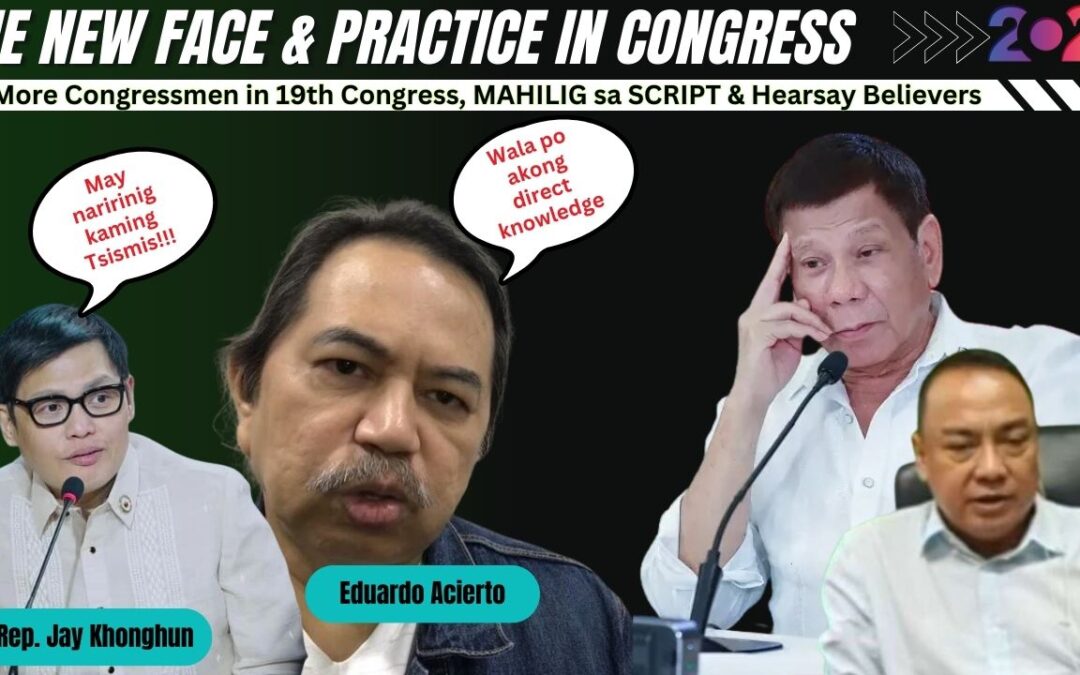Congress Hearing on the War on Drugs: Heated Exchanges and Controversial Accusations
The recent congressional hearing on the controversial war on drugs in the Philippines has brought to light several heated exchanges, particularly between PDEA (Philippine Drug Enforcement Agency) Chief Wilkins Villanueva and various lawmakers. The central focus of the hearing was the alleged protection and dismissal of cases against certain individuals, including Michael Yang, a former adviser to ex-President Rodrigo Duterte.
The Exchange Between PDEA Chief Villanueva and Congressman Jay Khonghun
The tension was palpable when Congressman Jay Khonghun took the floor, questioning PDEA Chief Wilkins Villanueva about why he dismissed allegations against Michael Yang. Khonghun insisted that Villanueva’s decision to spare Yang from further investigation was due to a supposed debt of gratitude (“utang na loob”) to former President Duterte. According to Khonghun, Villanueva’s actions were influenced by loyalty rather than the merits of the case.
Villanueva, however, stood firm in his defense, emphasizing that the case against Yang was dismissed because there was simply no substantial evidence to implicate him in drug-related activities. He reiterated that the PDEA operates on the basis of solid evidence and not on hearsay or unverified information. Villanueva stressed that while accusations and suspicions might circulate on social media and through informal channels, these do not meet the legal standards required for prosecution.
“Hearsay is not evidence,” Villanueva pointed out. “We cannot proceed with cases based on chismis (gossip). The integrity of our investigations relies on facts, not rumors.”
Despite Villanueva’s explanations, Congressman Khonghun persisted, arguing that Villanueva’s dismissal of the case was suspicious. He accused the PDEA Chief of possibly turning a blind eye due to personal or political ties. However, Villanueva countered by stating that basing accusations solely on what is heard or read on social media is irresponsible and dangerous, especially in the context of legal proceedings.
Congressman Benny Abante and the Issue with Former Cop Eduardo Acierto
The hearing took another turn when Congressman Benny Abante questioned Eduardo Acierto, a dismissed police officer, regarding his knowledge of the government’s war on drugs. Acierto has been vocal about his criticisms of former President Duterte’s anti-drug campaign. However, under questioning, Acierto admitted that he had no direct or personal knowledge of the intricacies of the war on drugs, which raised doubts about the credibility of his allegations.
This admission sparked public outrage, with many questioning why Acierto, who lacks firsthand experience, was attempting to persecute and damage the reputation of the former President. Critics argued that Acierto’s statements were not grounded in solid evidence and seemed more like a personal vendetta than a genuine concern for justice. Observers even noted that Acierto’s demeanor and past controversies cast doubt on his reliability as a whistleblower, with some describing him as more of a “killer” than a credible police officer.
Allegations Against Congressmen Dan Fernandez and Benny Abante
The hearing’s dramatic twists continued as accusations emerged against Congressmen Dan Fernandez and Benny Abante. Reports suggested that the two lawmakers attempted to induce Police Colonel Hector Grijaldo to provide false testimony against former President Duterte. This alleged coercion led to fears among the public and within the political sphere that some congressmen might be using their power to settle political scores.
When Duterte was informed of these alleged actions, he reportedly expressed his intention to file charges against Fernandez and Abante for subornation of perjury. Subornation of perjury involves persuading someone to commit perjury, which is a serious offense. The former President’s warning seemed to have an immediate effect, as both congressmen decided to temporarily recuse themselves from their committee positions. However, the damage to their reputations had already been done, as many saw their actions as an abuse of power and a clear attempt to undermine Duterte’s legacy.
“They have committed Principal by Inducement,” Duterte commented, referring to the legal principle where a person is held accountable for inducing another to commit a crime.
The fallout from these accusations was swift, with calls from both the public and political analysts for a deeper investigation into the conduct of the congressmen involved. This incident has also added a layer of complexity to the ongoing discourse surrounding the war on drugs, as it highlights potential abuses of authority and the use of congressional platforms for personal vendettas.
The Broader Implications for the War on Drugs and Political Accountability
The congressional hearing has once again brought the spotlight back to the war on drugs, a campaign that has been both lauded and criticized globally. While the Duterte administration has been credited with a no-nonsense approach to curbing drug-related crimes, it has also faced accusations of human rights abuses and extrajudicial killings.
The recent hearing, particularly the exchanges between PDEA Chief Villanueva, Congressman Khonghun, and others, underscores the complexity of the issue. On one hand, there are legitimate concerns about the integrity of law enforcement and the potential for political interference. On the other hand, there are accusations of politicians using the platform to air unverified claims, which can undermine genuine efforts to address the drug problem in the country.
Critics argue that hearings like these, when not grounded in solid evidence, can be reduced to political theater rather than serving as a means of achieving accountability. The use of social media and public opinion to drive narratives without corroborating evidence poses risks to the integrity of congressional investigations.
Conclusion
The recent congressional hearing on the war on drugs has highlighted the ongoing tensions between different branches of government, as well as the challenges of ensuring accountability in the country’s anti-drug campaign. As PDEA Chief Villanueva defended his agency’s actions based on a lack of evidence, congressmen like Jay Khonghun and Benny Abante faced backlash for relying on hearsay and social media-driven narratives.
The incident serves as a reminder of the need for rigorous standards of evidence in congressional inquiries, especially when they involve sensitive topics like the war on drugs. The accusations against Congressmen Dan Fernandez and Benny Abante further complicate the picture, suggesting that the war on drugs is not just a matter of law enforcement but also a battleground for political rivalries.
Moving forward, it remains to be seen how these hearings will influence public perception and policy decisions related to the war on drugs. However, what is clear is that both the government and the public will need to remain vigilant in distinguishing fact from fiction to uphold the rule of law and ensure justice is served.

